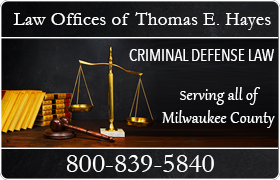Cudahy RICO Act Lawyer, Wisconsin
Sponsored Law Firm
-
 x
x

Click For More Info:
-
Law Offices of Thomas E. Hayes
161 W Wisconsin Ave Suite 3032 Milwaukee, WI 53203» view mapMilwaukee County Criminal Defense Over 30 Years of Experience
Clients should be comfortable with their lawyer. I am the only one who "works" my cases. My work ethic is efficient result oriented.
800-839-5840
Not enough matches for Cudahy RICO Act lawyer.
Below are all Cudahy Criminal lawyers.
Chris Head
Bankruptcy & Debt, Criminal, Divorce & Family Law, Tax
Status: In Good Standing *Status is reviewed annually. For latest information visit here Licensed: 12 Years

 Thomas Hayes Milwaukee, WI
Thomas Hayes Milwaukee, WI Contact UsRequest Consultation Now
Contact UsRequest Consultation Now Law OfficeLaw Offices of Thomas E. Hayes
Law OfficeLaw Offices of Thomas E. Hayes